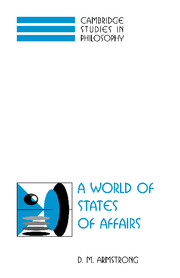Book contents
- Frontmatter
- Contents
- Preface
- 1 Introduction
- 2 Some preliminary doctrines
- 3 Properties I
- 4 Properties II
- 5 Powers and dispositions
- 6 Relations
- 7 Particulars
- 8 States of affairs
- 9 Independence
- 10 Modality
- 11 Number
- 12 Classes
- 13 Totality states of affairs
- 14 Singular causation
- 15 Laws I
- 16 Laws II
- 17 The unity of the world
- References
- Index
5 - Powers and dispositions
Published online by Cambridge University Press: 03 February 2010
- Frontmatter
- Contents
- Preface
- 1 Introduction
- 2 Some preliminary doctrines
- 3 Properties I
- 4 Properties II
- 5 Powers and dispositions
- 6 Relations
- 7 Particulars
- 8 States of affairs
- 9 Independence
- 10 Modality
- 11 Number
- 12 Classes
- 13 Totality states of affairs
- 14 Singular causation
- 15 Laws I
- 16 Laws II
- 17 The unity of the world
- References
- Index
Summary
INTRODUCTORY
Given properties and relations in our ontology, one great issue is whether they are repeatables (universals) or unrepeatables (tropes). We have opted for universals. But another large question in the theory of properties and relations demands our attention, an issue in great degree independent of the dispute between universals and tropes. It is an issue of equal importance, though perhaps less well canvassed. Concentrating, for convenience, on properties as opposed to relations, we think of them as bestowing powers upon the particulars that have them. A property that bestows no power will not be easy to detect! Conversely, if a particular has a power, either to act or be acted upon, then that is a property of the particular. The question arises, therefore, whether a property's nature is exhausted by the powers that it bestows, or whether instead the property, in itself, is to be distinguished from those powers. To discuss and come to a position on this issue is the main business of this chapter.
Properties (and relations) are thought of by some philosophers as having a nature that is self-contained, distinct from the powers that they bestow. We shall call this position Categoricalism. Others think of them as having a nature that essentially looks beyond the particulars they qualify, outward to potential interactions with further particulars, and where this nature is exhausted by these potential interactions. This view may be called Dispositionalism.
- Type
- Chapter
- Information
- A World of States of Affairs , pp. 69 - 84Publisher: Cambridge University PressPrint publication year: 1997



